Proton Wallet Review 2025: Safest Bitcoin-only Hot Wallet?
Proton Wallet is a secure, non-custodial Bitcoin wallet that offers privacy and simplicity for both beginners and advanced users. It features passphrase protection, easy export/import options, and seamless integration with Proton services for a streamlined experience.
Proton is a Swiss tech company that focuses on privacy-driven online services. It’s primarily owned by the non-profit Proton Foundation, creators of Proton Mail and Proton VPN. In recent years, Proton has placed a significant focus on Bitcoin.
In fact, they’ve just rolled out Proton Wallet to their 100 million users. This non-custodial Bitcoin wallet allows users to manage their own keys directly from their web browser.
In this review, we’ll explore what sets Proton Wallet apart from other solutions, while also looking into any potential drawbacks.
👉 Click here to get Proton Wallet for free.
| DESCRIPTION | DETAILS |
|---|---|
| 💻 Name | Proton Wallet |
| 🌐 Website | proton.me |
| 🗓 Release year | 2024-25 |
| 💰 Coins Supported | Bitcoin |
| 💸 Price | Free |
| 🔒 Security Features | Self-custody, End-to-end Encryption, Proton Sentinel, Open Source |
| 💻 Compatibility | iOS, Android |
| 🔄 Connectivity | Email-based Bitcoin transactions, Secure Recovery Methods |
| 📜 Software License | Open Source (GPLv3) |
| 📜 Warranty | No Warranty |
What Is Proton Wallet?
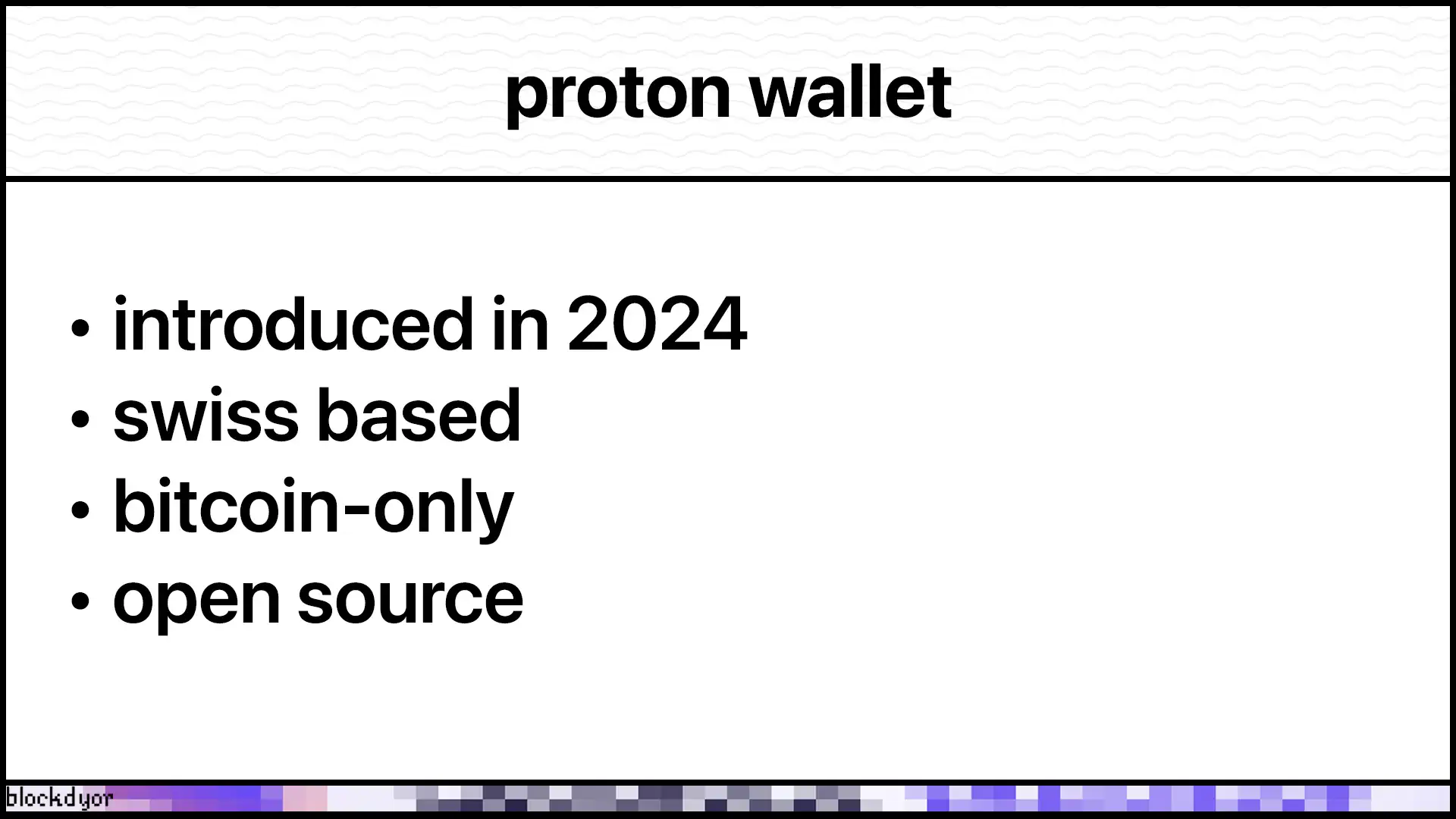
Proton Wallet aims to make Bitcoin storage and transactions simple without compromising security. It's an hot wallet, meaning it's connected to the internet, and a self-custodial wallet, meaning users control their own private keys—not Proton or any third party. This aligns with the fundamental Bitcoin principle: “Not your keys, not your coins.”
One of its standout features is the ability to send Bitcoin via email—but only between Proton users. This eliminates the need to deal with long wallet addresses, making transactions more beginner-friendly. However, this feature relies on Proton’s email infrastructure, which some Bitcoiners may see as a tradeoff between convenience and sovereignty.
The wallet supports on-chain transactions only, as it does not yet integrate the Lightning Network. This means higher fees and slower transactions if the mempool is (are) busy, which could be a dealbreaker for those who rely on Bitcoin for frequent, small payments.
Brief History Of Proton Wallet

Proton launched its first product, Proton Mail, as a public beta on May 16, 2014, after a successful crowdfunding campaign. The service, created by scientists who met at CERN, introduced end-to-end encrypted email to the public.
During the campaign, Proton faced a major setback when PayPal froze their funds, questioning the legality of encryption and government approval. Although the funds were eventually released, the incident reinforced the company’s need for financial independence.
This experience led Proton to hold part of its reserves in Bitcoin and, ultimately, to develop Proton Wallet. The wallet strengthens Proton’s resilience by providing users with a secure, independent way to manage Bitcoin, aligning with its vision of financial freedom.
How Proton Wallet Works
Using Proton Wallet is quite easy, with apps available for web, Android, and iOS. The setup process is quick, but it requires a Proton account, and within minutes, users can send, receive, and even purchase Bitcoin directly from the app.
Despite its ease of use, Proton Wallet includes several privacy-enhancing features, such as:
- Automatic new address generation for each transaction, reducing the risk of tracking.
- Passphrase protection (optional), adding an extra security layer beyond a standard password.
- Open-source code, allowing for independent audits to verify security claims.
For those looking for a simple, privacy-focused Bitcoin wallet, Proton Wallet presents an interesting option. However, the lack of Lightning support and UTXO management may limit its appeal to more advanced users.
Proton Wallet Main Features

Proton Wallet comes packed with features, and while it doesn’t yet support hardware wallets for airgapped signing, its open-source nature and zero-cost access make it a solid choice.
True Self-Custody and Privacy
Unlike exchanges that hold your Bitcoin for you, Proton Wallet ensures only you have access. It uses end-to-end encryption, meaning not even Proton can see or control your funds. Each transaction is PGP-signed for additional security.
Proton Wallet’s wallets come with a seed phrase, allowing you to export and import them since they are fully on-chain and non-custodial. You can also add an extra passphrase for added security, alongside your Proton account credentials and the Proton passphrase.
Safer and Simpler Transactions
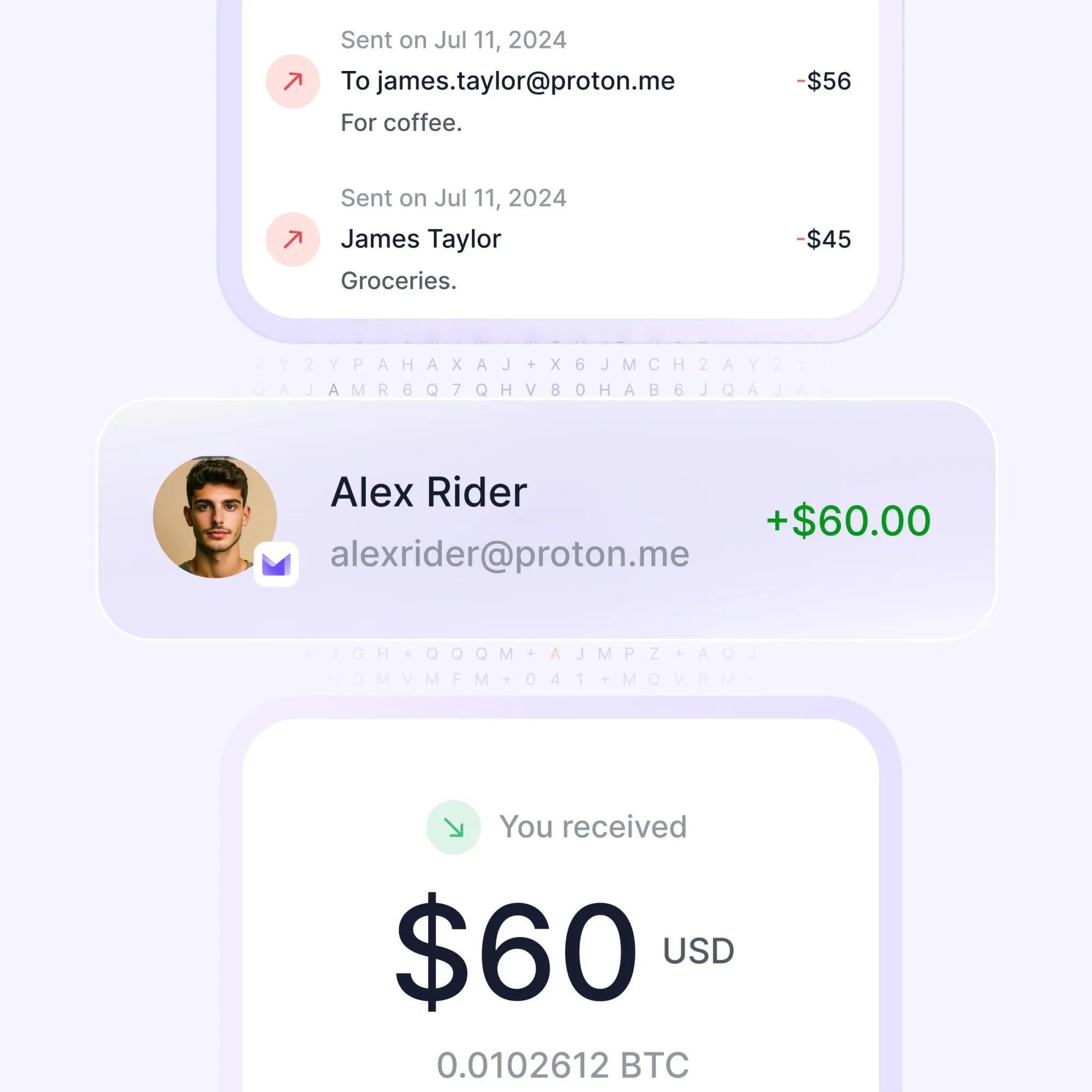
Bitcoin transactions are irreversible, and mistakes can be costly. Proton Wallet’s Bitcoin via Email feature removes the risk of copying the wrong address. Instead, users can send BTC securely by verifying an email, streamlining the process while reducing errors.
Built-in Bitcoin Buying and Private Transactions
Buying Bitcoin is seamless, with credit card and bank transfer support in over 150 countries. Every time you receive BTC, Proton Wallet automatically generates a fresh address, making it harder to link payments and preserving your privacy.
Open Source & Swiss-Made
Headquartered in Switzerland, Proton Wallet benefits from strong privacy laws. It’s open source, allowing for full transparency, and uses Proton Sentinel, an advanced security system that protects accounts from unauthorized access—even if credentials are compromised.
Customer Service
Unlike most wallets, Proton offers 24/7 human support. Beyond that, it stands for privacy and financial freedom, ensuring Bitcoin remains a tool for individual empowerment rather than centralized control.
Proton Wallet Quick Review
While Proton Wallet isn’t the highest scorer, it earned 81 points, which still translates to 5 stars. It has everything needed to get started on the Bitcoin main chain, and it can only improve from here, as more features are likely to be added in the future.
| Category | Feature | Score |
|---|---|---|
| 🔐 Privacy & Security (45/50) | ||
| 📄 Open Source Compliance | Source code is publicly available and open source | 10/10 |
| 🔄 Software Integrity | Software can be built from source and verified | 10/10 |
| 🔐 Security | Non-custodial wallet with passphrase support | 5/5 |
| 🌱 Seed Generation | Uses a secure method for entropy generation | 5/5 |
| 💾 Seed Storage | Stored securely within the Proton ecosystem | 4/5 |
| 💼 Hardware Wallet | No hardware wallet support | 1/5 |
| 💰 Purchase Procedure | The wallet is free to use | 5/5 |
| 💸 Fees | Only Bitcoin network fees apply | 5/5 |
| 🚀 Features (36/50) | ||
| 🖥️ User-Friendly UX | Clean and simple user interface | 5/5 |
| 🎨 Design | Modern and intuitive | 5/5 |
| 📡 Air Gap / PSBT / SeedQR | Lacks PSBT and airgapped support | 1/5 |
| 💾 MicroSD Backup | No MicroSD backup functionality | 1/5 |
| 🤝 Multisignature Support | Doesn't support multisig wallets | 1/5 |
| 🔐 Passphrase (BIP39) | Supports BIP39 passphrases | 5/5 |
| 🔌 Connection | Works via web and app, with Tor or Proxy support | 4/5 |
| 📦 Ready-to-Use | No complex setup required | 5/5 |
| 📚 Documentation | Basic documentation available | 4/5 |
| 🛠️ Customer Support | Proton offers official support via its platform | 5/5 |
| 🧱 blockdyor Score (81/100) |
How To Get Started With Proton Wallet
Proton Wallet can be installed by downloading the app on the App Store on iOS/Android but also without installation by just opening up an account with Proton with your browser.
👉 Click here open a Proton account and use Proton Wallet.
By clicking the link down here you can open a Proton account, which includes secure mail, VPN & much more and of course the Proton Wallet. You can decide to go for the free account, but also choose the paid ones that features more premium features and more storage & much more.
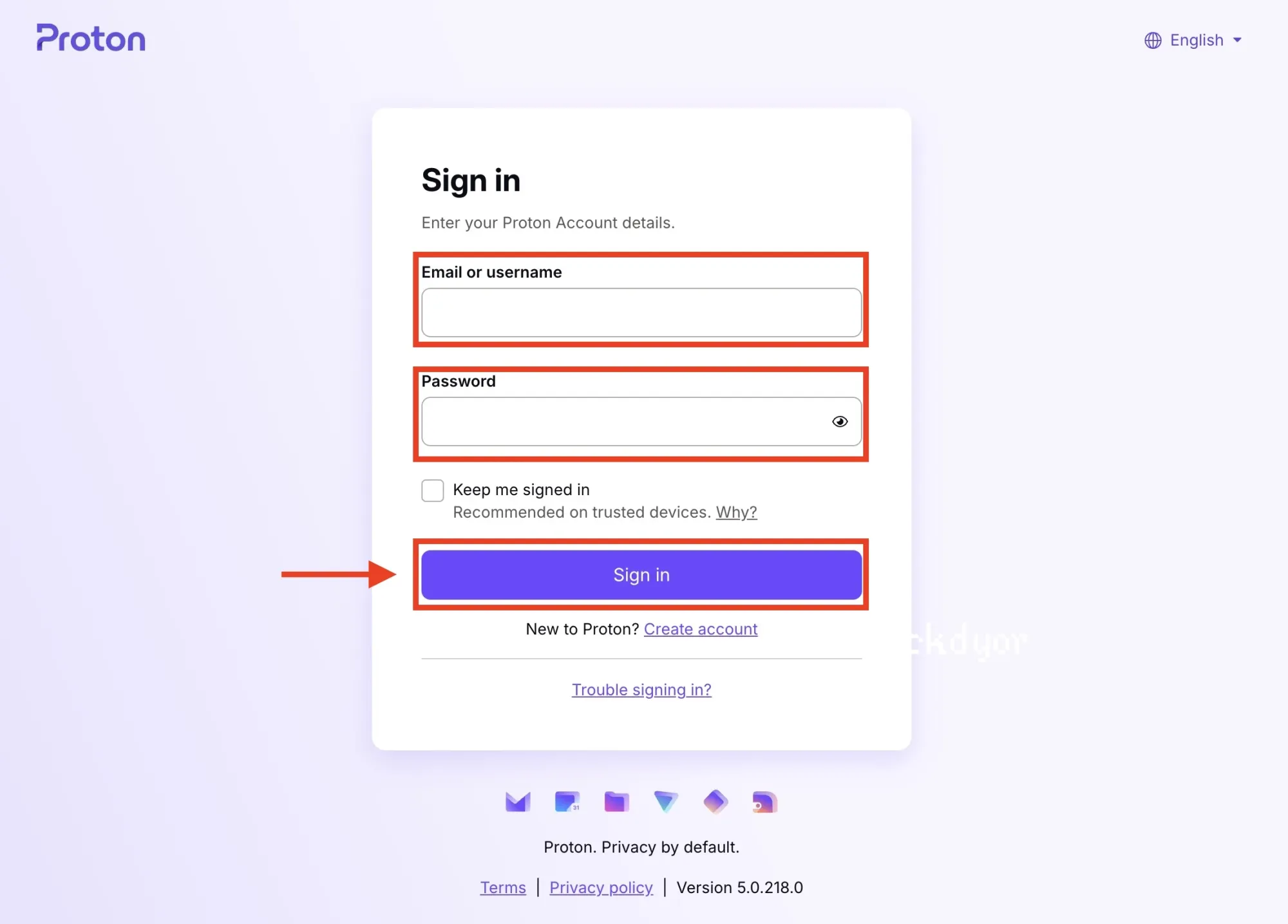
After signing up, head to the login page, enter your email and username, then click “Sign In.”
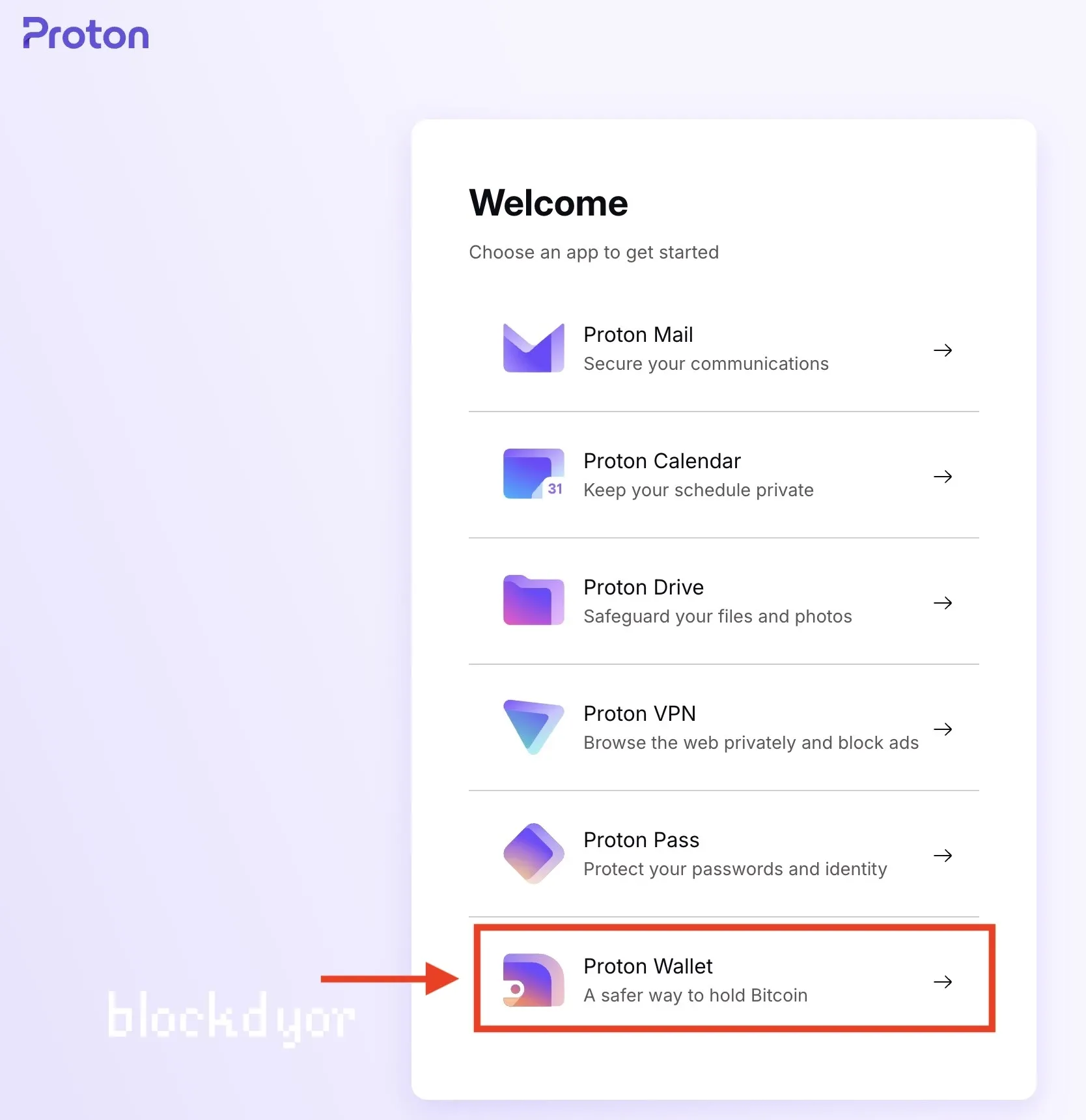
Next, choose the service from Proton Wallet’s extensive list. While it offers various features, we’re only focusing on the wallet for now.
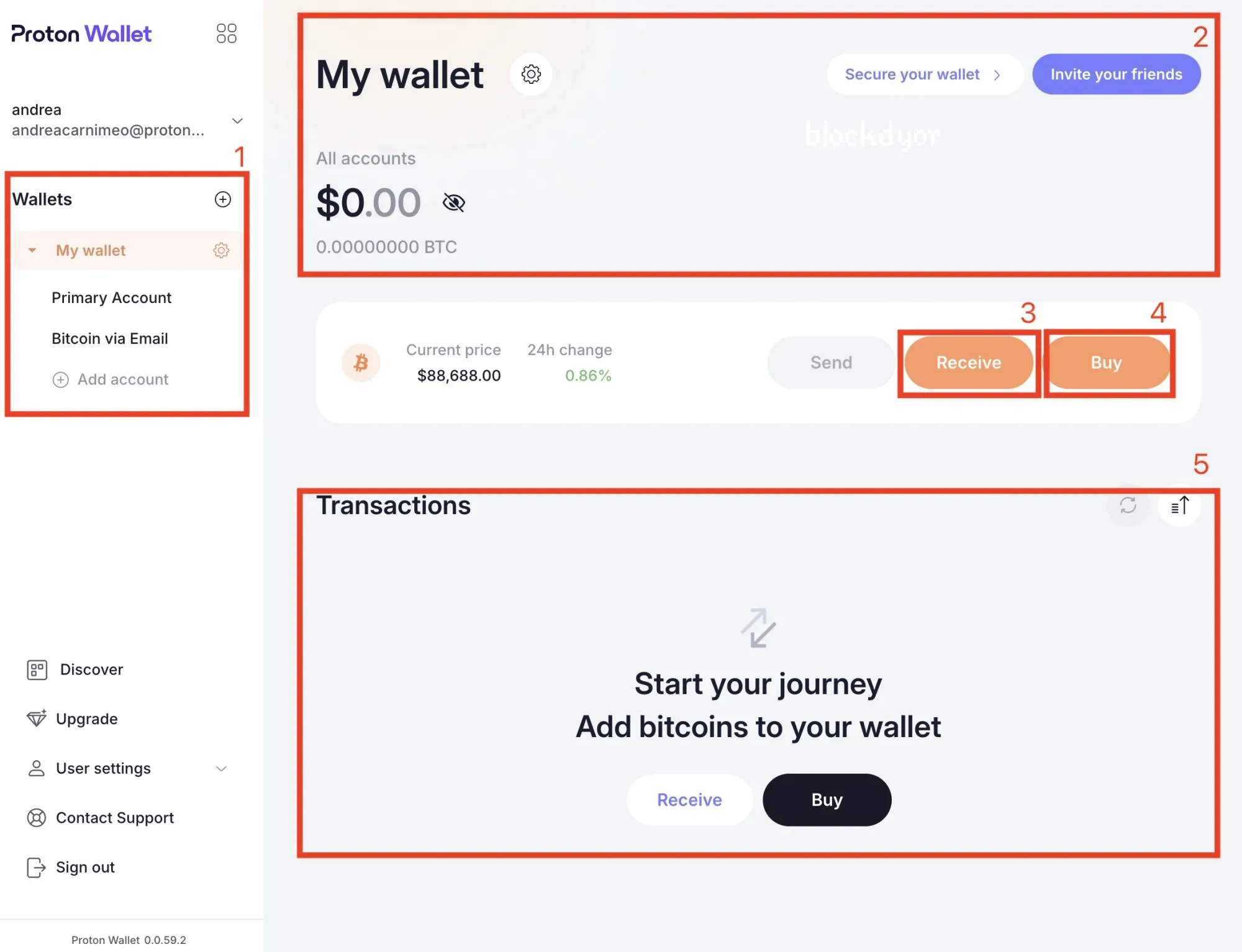
Proton Wallet’s interface is minimalistic and straightforward. It’s a pure on-chain Bitcoin wallet, focused solely on that purpose without extra features. This makes it a solid choice for beginners or those who prefer simplicity.
On the left, you’ll find the wallet section (1). By default, you start with two accounts: a primary Bitcoin wallet and a separate Bitcoin via Email wallet. Proton keeps them separate for security reasons, but you can merge them in the settings if preferred.
At the top (2), your balance is displayed, followed by a transaction history below (5). The send button is initially grayed out since you need to receive Bitcoin first (3). If you’re looking to buy BTC, there’s a “Buy” (4) button that connects you to Proton’s partners for purchasing options.
Receiving Bitcoin with Proton Wallet
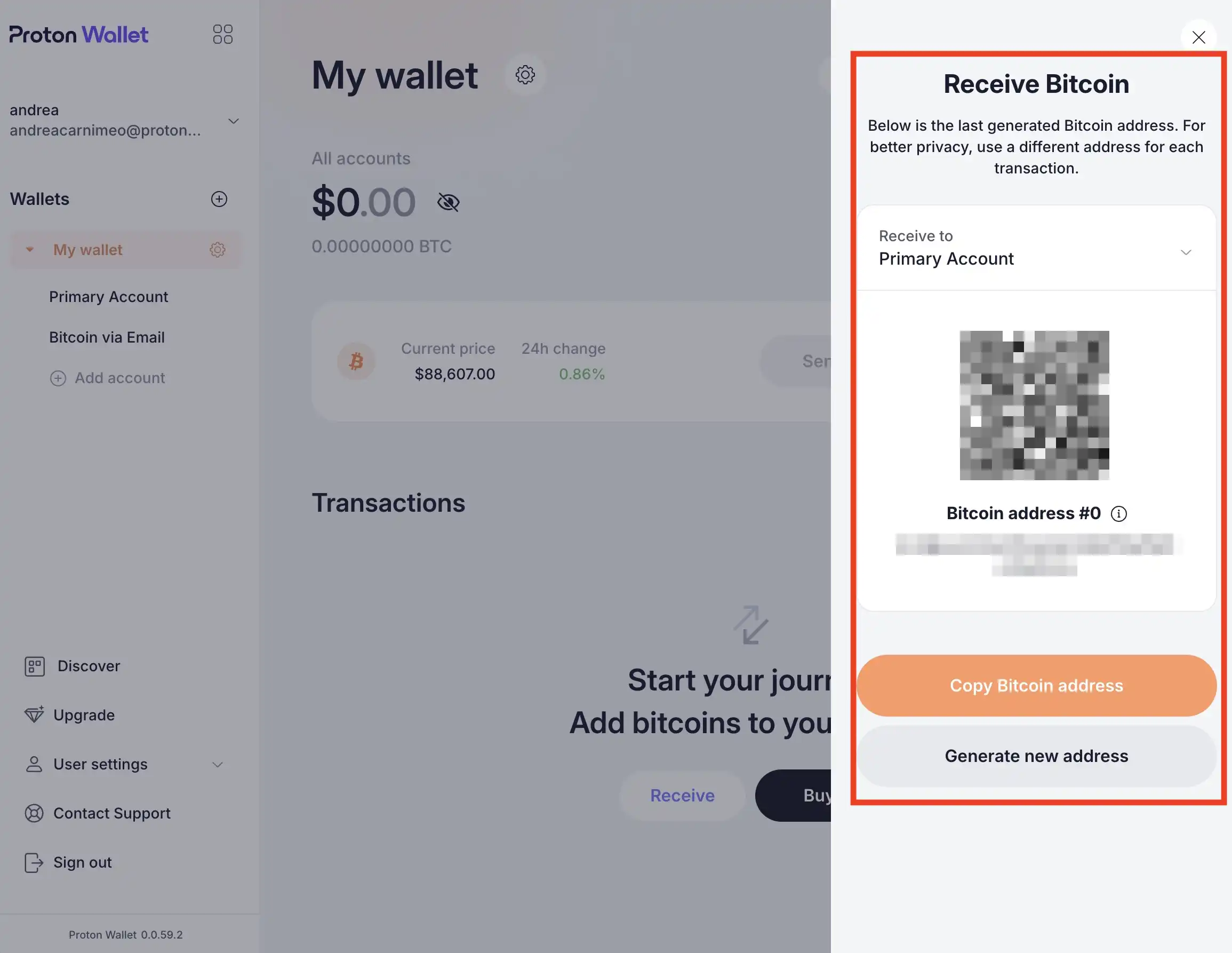
Proton Wallet generates a new address for each transaction, following best practices to enhance privacy. When you click the receive button, a section opens within the wallet displaying a QR code for the newly generated address, along with the alphanumeric version for easy copying and pasting. This ensures that each incoming transaction uses a fresh address, reducing traceability.
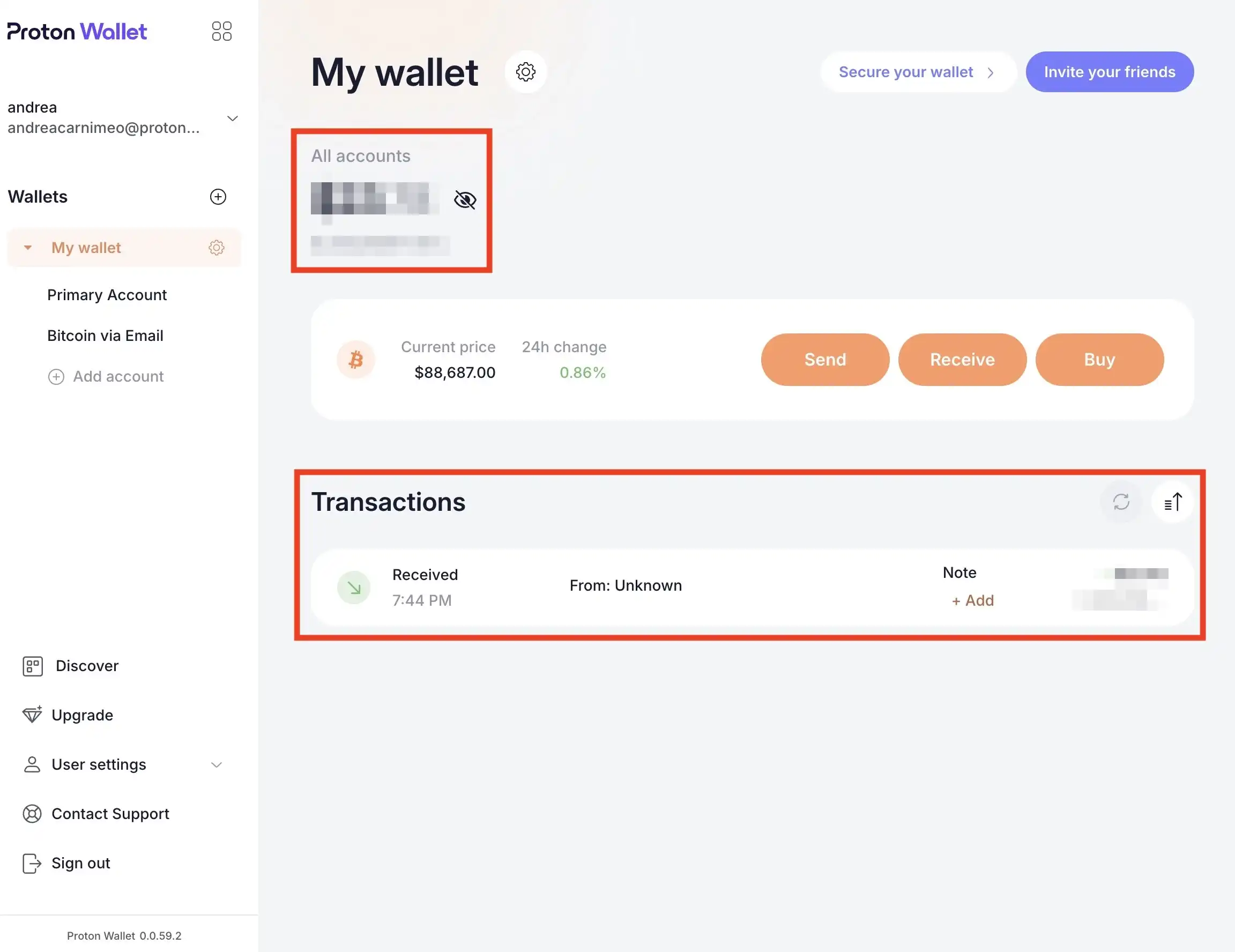
When the coins will be received in your wallet, they will show up in the transaction area. If you click on it you will be able to get more informations on it and even label them.
Sending Bitcoin with Proton Wallet
Sending BTC from Proton Wallet is simple. Just click on “Send” from the main dashboard. If your balance is empty, you also have the option to buy Bitcoin through Proton Wallet’s integrated partner services.
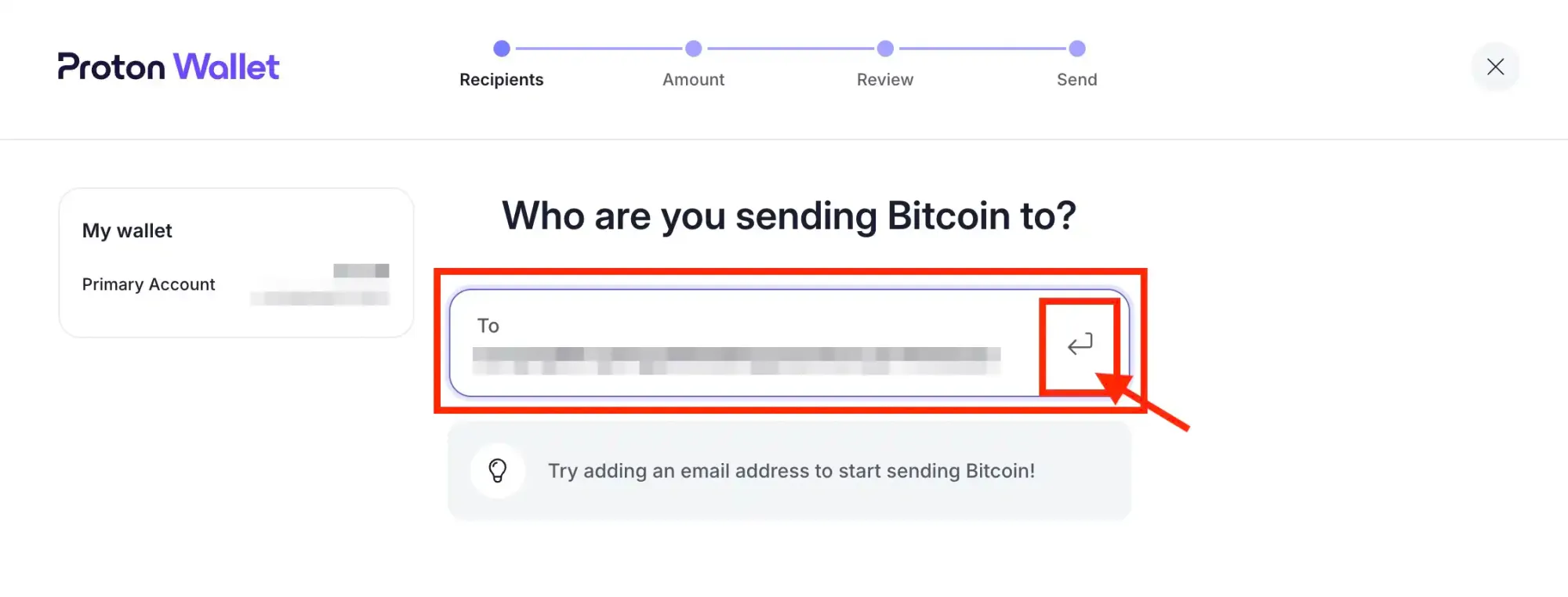
You’ll be prompted to enter the recipient’s address. Once entered, simply click the arrow to proceed.
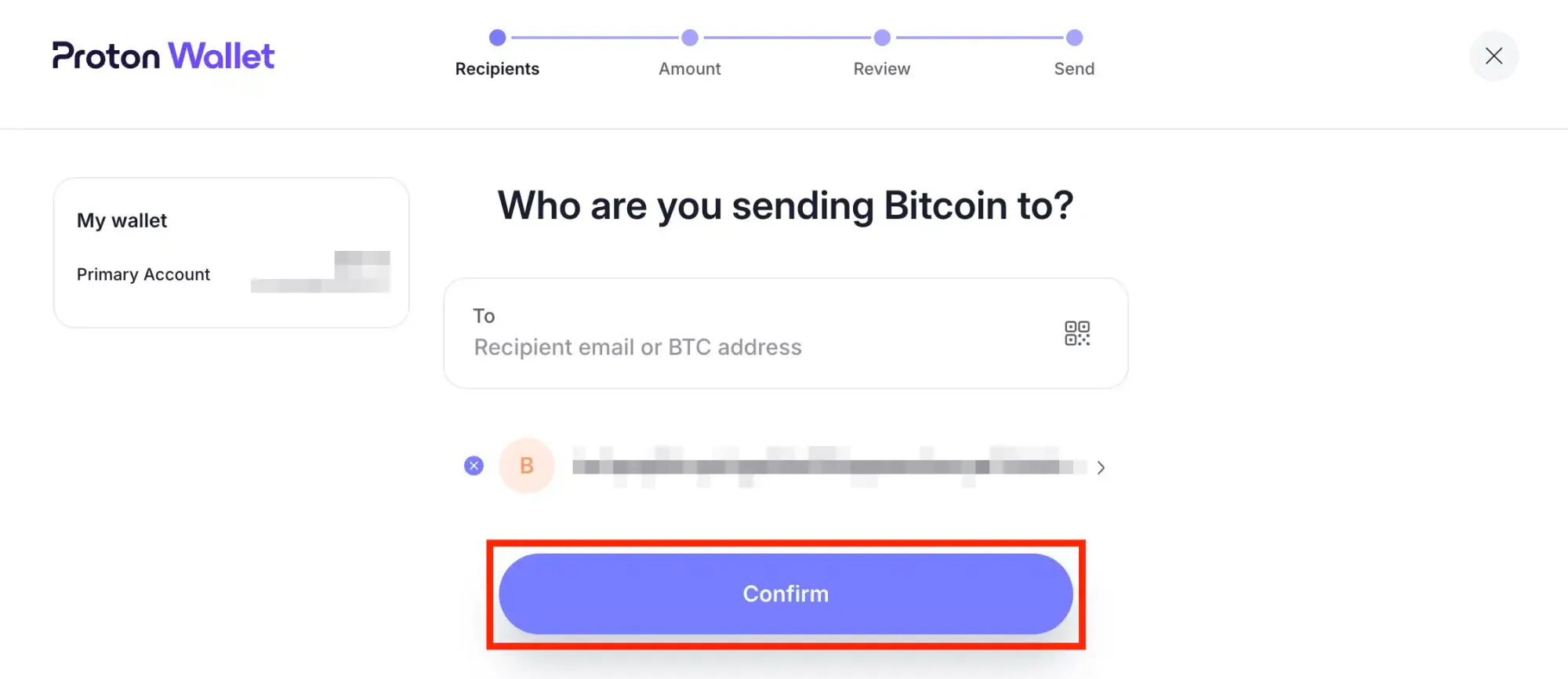
Click the purple “Confirm” button to move to the next step.
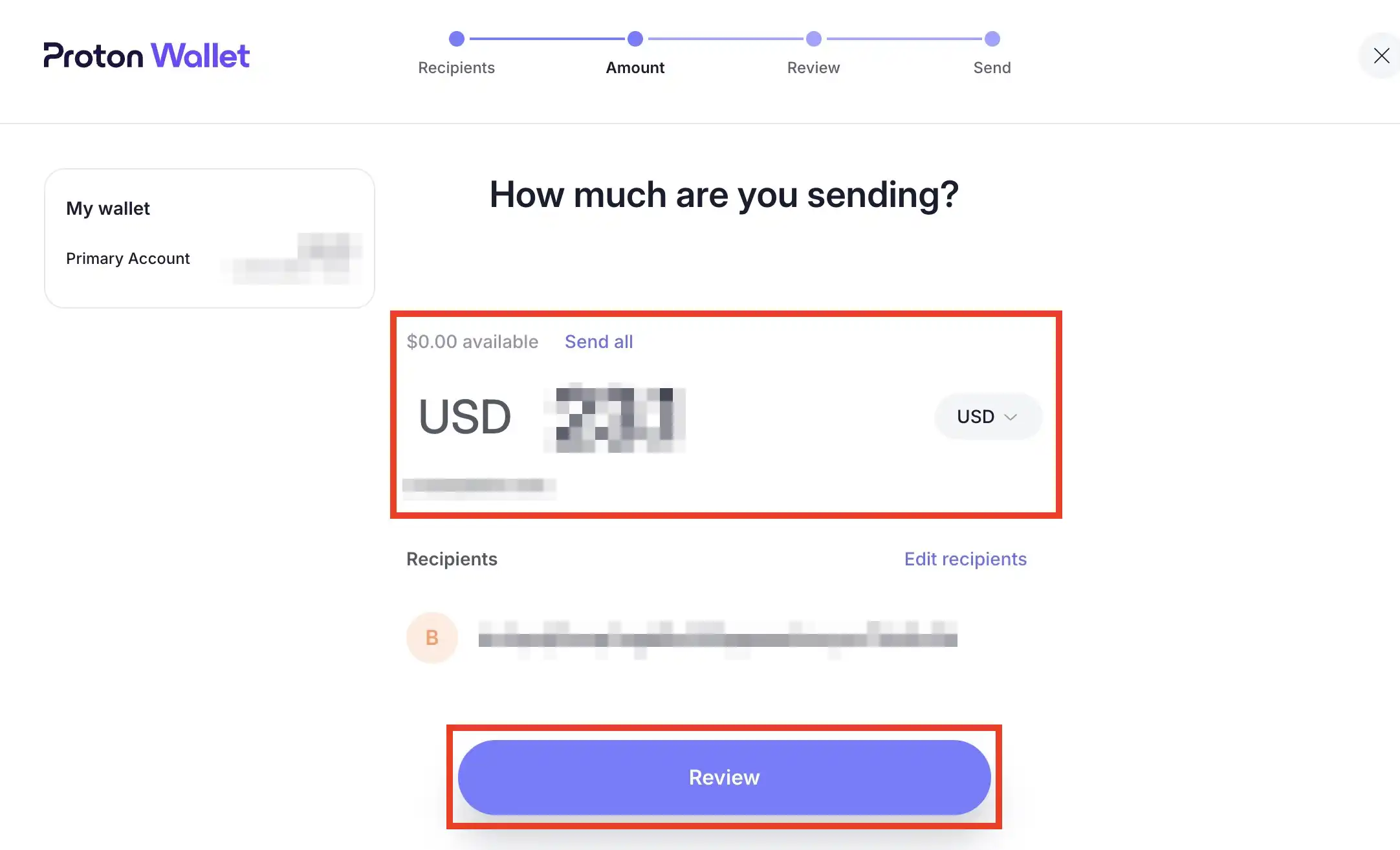
Enter the desired amount you want to send, then click the “Review” button.
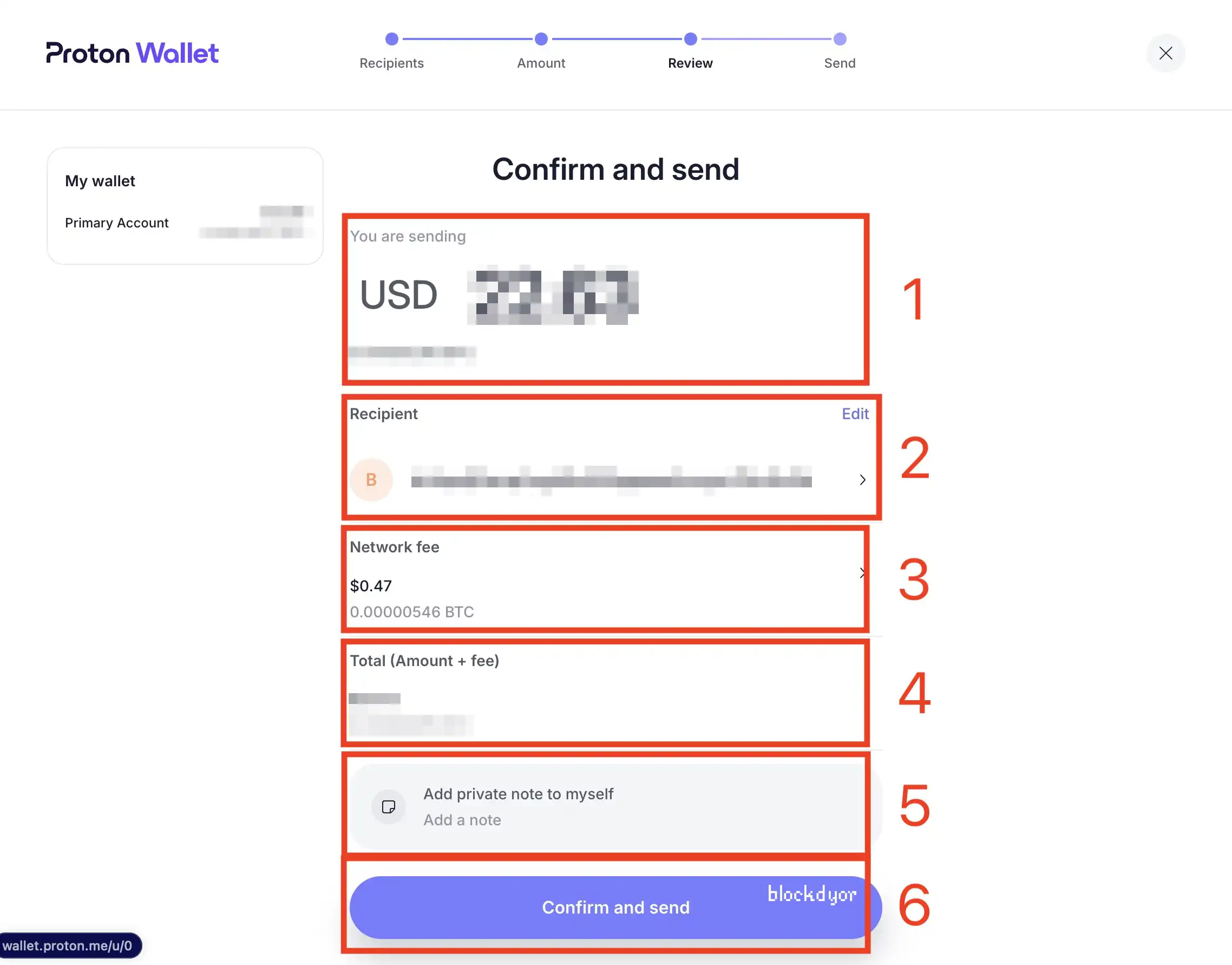
Review all the details carefully, including:
- Amount to send (1)
- Recipient address (2)
- Network fee (3)
- Total amount (including fee) (4)
- Label (optional) (5)
Once everything looks correct, click “Confirm and Send.” (6)
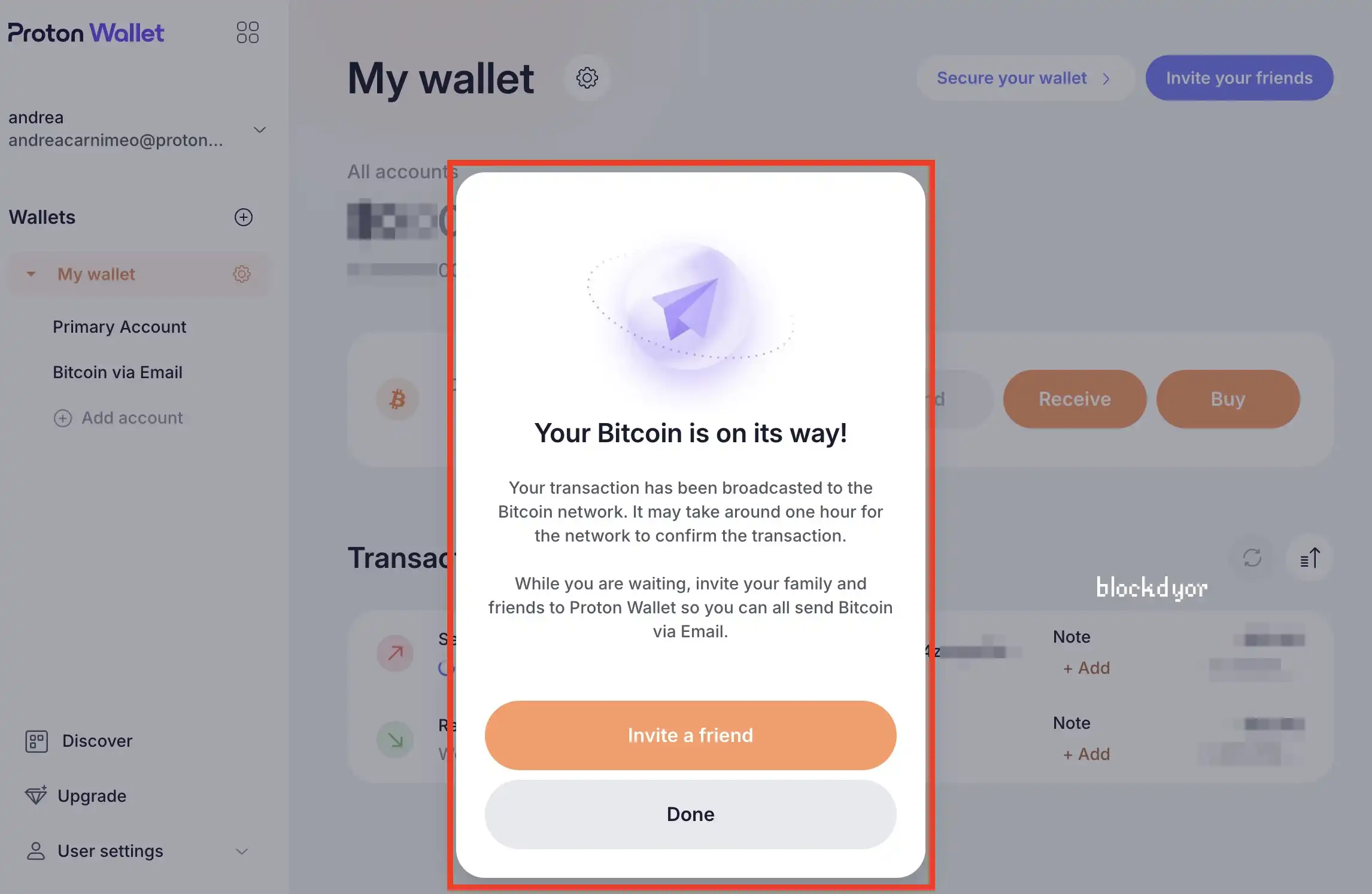
Proton Wallet Alternatives
Finding alternatives to Proton that offer both app and web app access with the same level of security backed by Switzerland’s high standards is tough, but there are several on-chain wallets that perform quite well.
BlueWallet: BlueWallet is an open-source, user-friendly Bitcoin wallet offering both mobile and desktop access. It supports hardware wallets like Trezor and Ledger, providing extra security for users. BlueWallet also integrates features like Lightning Network support, multi-signature capabilities, and seamless transaction management. While it doesn’t have the same strict privacy policies as Proton, it still provides a solid balance between usability and security.
Sparrow Wallet: Sparrow Wallet is an open-source, desktop-focused Bitcoin wallet known for its advanced privacy features and security. It offers support for hardware wallets and is well-suited for users who prioritize control over their private keys. SparrowWallet’s supports several hardware wallets, but can also be used as a software wallet. It has also the ability to configure multisig setups. While it doesn’t come with mobile access, its web wallet counterpart and desktop app make it a great option for those who want a more secure, privacy-focused solution.
Proton Wallet Pros & Cons
| Pros | Cons |
|---|---|
| ✅ Open-source and transparent | ❌ No hardware wallet support for airgapped signing |
| ✅ High security backed by Swiss privacy laws | ❌ Limited features compared to some other wallets |
| ✅ Easy-to-use interface, great for beginners | ❌ Lacks some advanced features like coin control |
| ✅ Self-custody wallet (You control your keys) | ❌ Not fully customizable for advanced users |
| ✅ Integrated Bitcoin via Email feature for easy receiving | ❌ Limited privacy features compared to specialized privacy wallets |
| ✅ Available on both app and web platforms |
Bottom Line
Let’s be honest: Proton Wallet might not be the top contender for the best Bitcoin wallet out there, but that doesn’t mean it’s the worst either. One feature that stood out to me is the ability to send Bitcoin via email, which is a cool twist on something similar we’ve seen with River’s River Link.
If you’re okay with creating a Proton account—whether free or paid (for premium features)—you’ll find the free version surprisingly private, requiring just a username and password. Of course, the paid plan asks for your credit card details, though you can also pay with Bitcoin.
Proton Wallet is good for Bitcoin. And it’s impressive that a company with over 100 million users is so committed to Bitcoin. As we’ve seen, Bitcoin played a key role in their business growth, and they’ve come a long way. So, if you’re already using Proton’s secure email or VPN services, adding their wallet to store Bitcoin is a no-brainer. Being web-based, it can lighten the load on your phone by consolidating your wallets into one, especially considering it’s a newer wallet with a lot of potential down the road.
Bottom Line
Proton Wallet is a solid, secure choice for Bitcoin users who value privacy and simplicity. While it may not boast the advanced features of some other wallets, its strong security, ease of use, and transparent development make it a reliable option for anyone looking to store Bitcoin safely.
Whether you’re a beginner or someone who appreciates a straightforward, no-fuss wallet, Proton Wallet offers a solid foundation, with potential for growth as the platform continues to evolve.
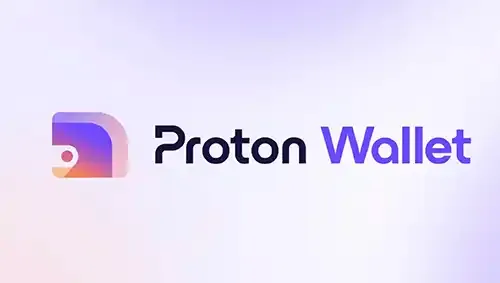
Proton Wallet Evaluation
With a solid blockdyor Score of 81 out of 100, Proton Wallet stands out as a secure and user-friendly option for Bitcoin storage. Though it doesn’t have as many advanced features as some other wallets, it offers all the essentials for Bitcoin users and is built on strong privacy and security principles.
Security: Proton Wallet offers robust security, including a passphrase feature and non-custodial, on-chain storage for your Bitcoin. You can also add extra protection with your Proton account credentials and passphrase. For enhanced privacy, it follows the high Swiss security standards that the company is known for.
User-Friendliness: Proton Wallet strikes a balance between privacy and ease of use. The interface is straightforward, making it simple to navigate even for beginners, while still supporting key features for experienced users.
Compatibility: Proton Wallet works across all major platforms, with a web-based version that adds flexibility. It is also compatible with hardware wallets for those seeking additional security layers.
Reputation: Developed by the well-established Proton team, known for their privacy-focused services like Proton Mail, Proton Wallet benefits from the same commitment to security and transparency. The open-source nature allows for ongoing community contributions and audits, enhancing trust in the product.
Cost: Proton Wallet is free to use, with a premium version available that adds extra features. The free version is completely anonymous and requires only a username and password to get started.

